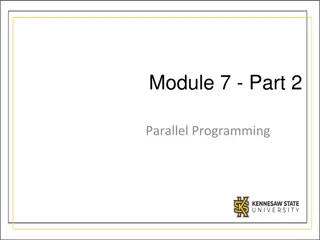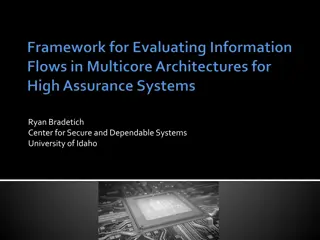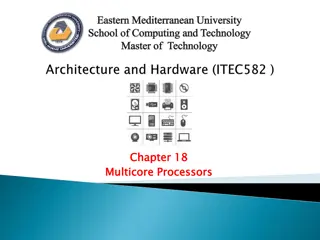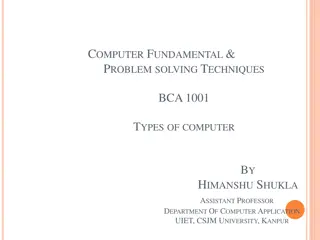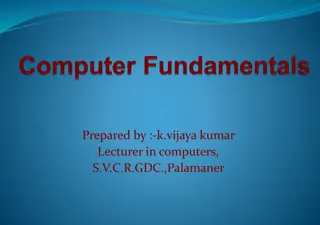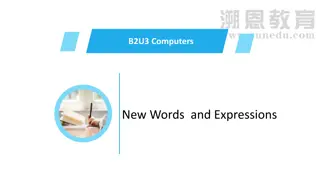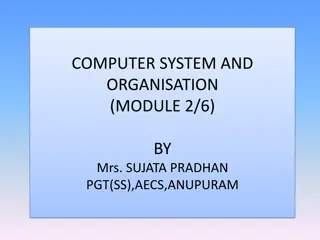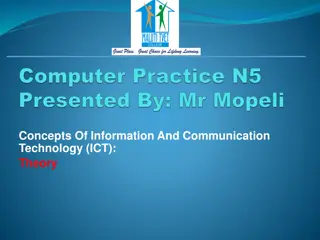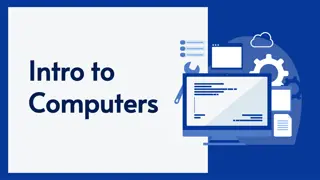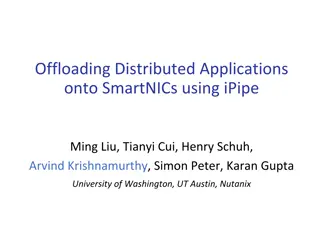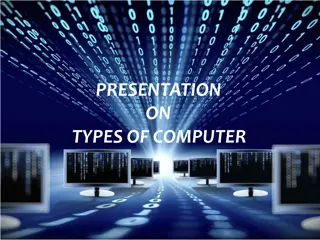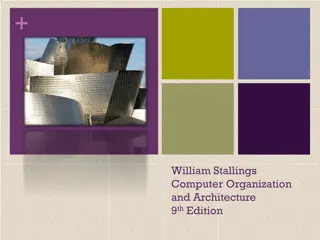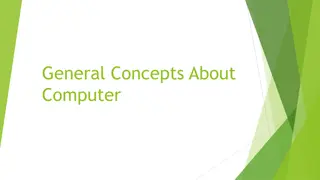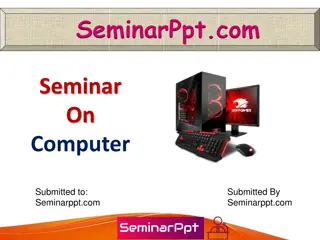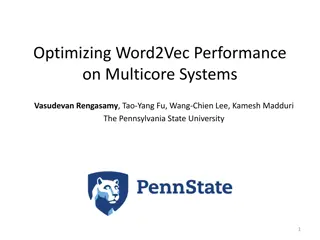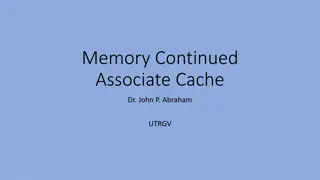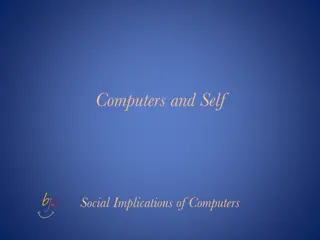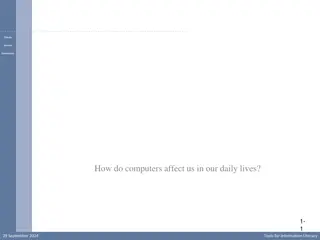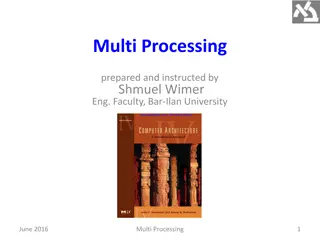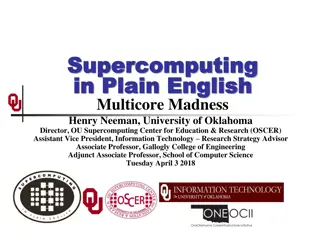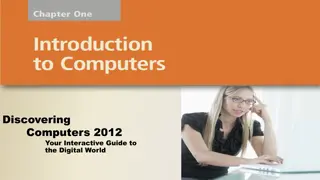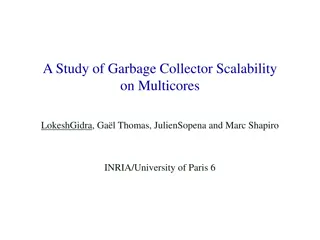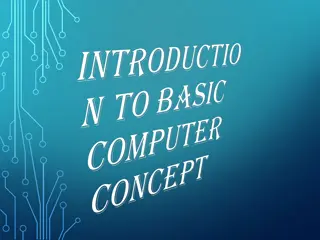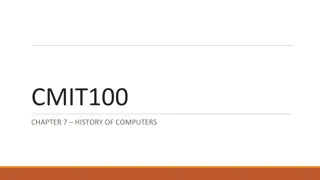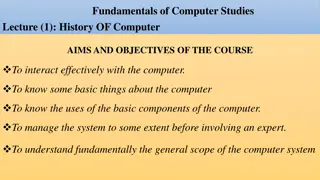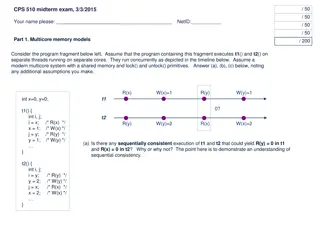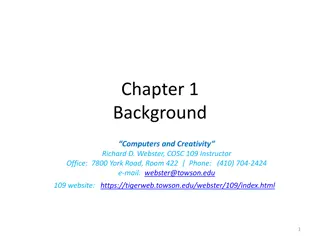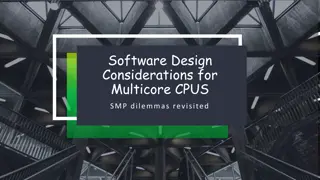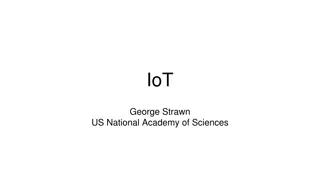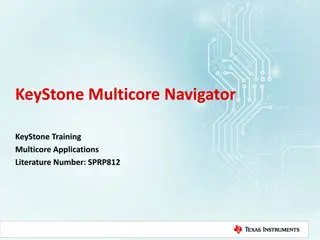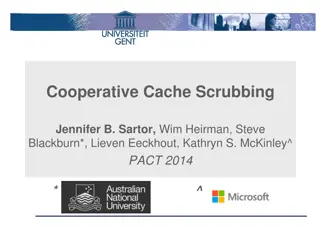Evolution of Parallel Programming in Computing
Moores Law predicted the doubling of transistor capacity every two years, benefitting software developers initially. However, hardware advancements can no longer ensure consistent performance gains. Parallel computing, leveraging multicore architecture, has emerged as a solution to optimize performa
7 views • 10 slides
Essential Factors Affecting Computers' Maintenance
Computers are susceptible to damage from various factors such as heat, dust, water, corrosive liquids, and powerline problems. To ensure optimal performance and longevity, it is crucial to monitor and address these elements to prevent potential harm. Proper maintenance practices like controlling hea
5 views • 14 slides
Secure System Architecture Progression Framework Overview
Explore the evolution of secure system architectures, including multicore analysis and components like Cell Broadband Engine, Intel Core i, Freescale P4080. Dive into centralized processing systems, memory management, and hardware evaluations for improved processing power and security measures.
0 views • 30 slides
Understanding Multicore Processors: Hardware and Software Perspectives
This chapter delves into the realm of multicore processors, shedding light on both hardware and software performance issues associated with these advanced computing systems. Readers will gain insights into the evolving landscape of multicore organization, spanning embedded systems to mainframes. The
1 views • 36 slides
The Impact of Computers in Everyday Life
Computers play a vital role in various aspects of our daily lives, from education to business, healthcare, and banking. They help in converting data into meaningful information, enabling digital learning in schools, supporting businesses in marketing and management, aiding doctors in quicker diagnos
0 views • 9 slides
Types of Computers: Supercomputer, Mainframe, Mini, Workstation, Microcomputer
Computers come in various sizes and power ranges, each with unique capabilities. Supercomputers analyze nuclear fission models, mainframe computers have special circuits, mini computers support multi-user environments, workstations offer high processing speed, and microcomputers are affordable perso
0 views • 5 slides
Introduction to Computer Fundamentals: Learn the Basics of Computers
This tutorial covers fundamental concepts of computer hardware, software, and operating systems, explaining how computers process data, generate output, and store information. It explores the advantages of computers, such as high speed, accuracy, storage capacity, diligence, and versatility, essenti
1 views • 11 slides
Introduction to Computers: New Words and Expressions
Explore the fascinating world of computers with new terminology and expressions such as artificial intelligence, technology, exploration, and more. Discover the language surrounding computers and their applications, functions, and development. Enhance your understanding of this technological realm t
1 views • 19 slides
Introduction to Embedded Systems Design
Embedded Systems Design, Chapter 1 provides an insightful overview of embedded systems, distinguishing them from general-purpose computers. The chapter delves into the characteristics of embedded systems, their design considerations, and the various types of embedded computers such as general-purpos
1 views • 7 slides
Understanding Computer Systems and Organizations
In this module by Mrs. Sujata Pradhan, learn about the characteristics of computers, their basic architecture, and the role of different units and memory types. Explore the classification of computers based on operation and configuration, including digital, analog, hybrid, supercomputers, mainframes
0 views • 13 slides
Understanding Types of Computers in Information and Communication Technology (ICT)
Explore the main types of computers in ICT, including Mainframe Computers, Servers, and Personal Computers such as Desktops, Laptops, and Tablets. Learn about their functions, uses, and distinguishing features to enhance your understanding of ICT.
1 views • 20 slides
Understanding Computers: Key Components and Characteristics
A computer is a programmable electronic device designed to process, store, and retrieve data. This article delves into the key components and characteristics of computers, including hardware, software, data processing, storage, input/output devices, networking, and programming. Computers play essent
0 views • 36 slides
SmartNIC Offloading for Distributed Applications
This presentation discusses offloading distributed applications onto SmartNICs using the iPipe framework. It explores the potential of programmable NICs to accelerate general distributed applications, characterizes multicore SmartNICs, and outlines the development and evaluation process. The study c
0 views • 31 slides
Understanding Different Types of Computers
Explore the classifications of computers based on functionality, size, speed, and cost. Learn about analog, digital, and hybrid computers, their characteristics, and examples. Understand the distinct features and uses of each type in the world of computing.
6 views • 10 slides
Trends in Computer Organization and Architecture
This content delves into various aspects of computer organization and architecture, covering topics such as multicore computers, alternative chip organization, Intel hardware trends, processor trends, power consumption projections, and performance effects of multiple cores. It also discusses the sca
5 views • 28 slides
Exploring General Concepts About Computers
Computers are electronic devices capable of accepting data, processing it based on instructions, and generating output. They can perform functions like input, processing, output, and storage. This article delves into the basics of what computers are, the difference between data and information, exer
0 views • 15 slides
Evolution of Computers: From Vacuum Tubes to Transistors
The evolution of computers has seen remarkable progress from the era of vacuum tube machines to the introduction of transistors. Starting from massive devices to compact and powerful systems, computers have become an indispensable part of modern life. Explore the generations of computers, their func
0 views • 22 slides
Understanding the Computer Fraud and Abuse Act (CFAA) of 1984
The Computer Fraud and Abuse Act (CFAA) of 1984, later amended in 1992, addresses criminal and civil liability for unauthorized access to computers and obtaining information. The law distinguishes between outsiders and insiders who exceed their authorized access. It includes provisions related to na
12 views • 33 slides
Optimizing Word2Vec Performance on Multicore Systems
This research focuses on improving the efficiency of Word2Vec training on multi-core systems by enhancing floating point throughput, reducing overheads, and avoiding any accuracy loss. The study combines optimization techniques to achieve parallel performance and evaluates the accuracy of the result
0 views • 30 slides
Understanding Basic Concepts of Information Technology
Explore fundamental concepts in Information Technology including basic terms, types of computers, hardware, software, and general IT concepts. Learn about different types of computers such as supercomputers, mainframe computers, servers, networked computers, personal computers, laptops, and handheld
1 views • 13 slides
Efficient Dynamic Memory Management for Embedded Multicore Systems
This content delves into the challenges of dynamic memory management in embedded multicore systems, emphasizing the importance of transaction-friendly approaches. It covers parallel data structures, the role of operating systems/libraries, and principles of memory allocation. Through illustrations a
0 views • 24 slides
Fast Multicore Key-Value Storage Study
Explore Cache Craftiness for Fast Multicore Key-Value Storage in a comprehensive study on building a high-performance KV store system. Learn about the feature wishlist, challenges with hard workloads, initial attempts with binary trees, and advancements with Masstree. Discover the contributions and
0 views • 38 slides
Understanding Cache Memory in Computer Systems
Explore the intricate world of cache memory in computer systems through detailed explanations of how it functions, its types, and its role in enhancing system performance. Delve into the nuances of associative memory, valid and dirty bits, as well as fully associative examples to grasp the complexit
0 views • 15 slides
Implications of Computers on Human Existence and Behavior
Exploring the philosophical debate between free will and predestination, the influence of online personas on real-life identities, the potential for computers to understand us better than ourselves, and the evolving role of humans in an increasingly automated world. These themes delve into the compl
0 views • 6 slides
Evolution of Computers in Daily Life
Computers have significantly transformed our daily routines over the years, from simple tasks like setting alarms to complex operations like online shopping and banking. The progression from basic functions to advanced capabilities has revolutionized how we interact with technology on a day-to-day b
0 views • 36 slides
Understanding Multi-Processing in Computer Architecture
Beginning in the mid-2000s, a shift towards multi-processing emerged due to limitations in uniprocessor performance gains. This led to the development of multiprocessors like multicore systems, enabling enhanced performance through parallel processing. The taxonomy of Flynn categories, including SIS
0 views • 46 slides
Supercomputing in Plain English: Multicore Madness Workshop Details
Prepare for the "Supercomputing in Plain English: Multicore Madness" workshop with important instructions such as muting yourself, downloading slides in advance, and accessing the session via Zoom or YouTube. The session, led by Henry Neeman from the University of Oklahoma, covers supercomputing top
0 views • 97 slides
Overview of Nested Data Parallelism in Haskell
The paper by Simon Peyton Jones, Manuel Chakravarty, Gabriele Keller, and Roman Leshchinskiy explores nested data parallelism in Haskell, focusing on harnessing multicore processors. It discusses the challenges of parallel programming, comparing sequential and parallel computational fabrics. The evo
0 views • 55 slides
Introduction to Discovering Computers: Your Interactive Guide to the Digital World
Delve into the world of computers with "Discovering Computers 2012," exploring basic concepts such as the definition of a computer, its components, importance of computer literacy, and the role of computers in various sectors. Discover the distinctions between system and application software, types
0 views • 38 slides
Study of Garbage Collector Scalability on Multicores
This study delves into the scalability challenges faced by garbage collectors on multicore hardware. It highlights how the performance of garbage collection does not scale effectively with the increasing number of cores, leading to bottlenecks in applications. The shift from centralized to distribut
0 views • 23 slides
Special Pricing on Surplus Computers - Dell, Optiplex, iMac, Monitors
Explore a variety of surplus computers including Dell Optiplex GX series, iMac G4 & G5, and monitors at discounted prices. Contact the surplus specialist for availability and grab deals starting from $50. All computers come with essential accessories like keyboard, mouse, and power cord.
0 views • 4 slides
Evolution of Computing: From Abacus to Computers
The history of computing traces back to the invention of tools like the Abacus and Napier's Bone, leading to the development of advanced computing devices such as slide rules and ultimately modern computers. Computers have evolved to become programmable machines that receive input, process data, and
0 views • 7 slides
Evolution of Computers: From Abacus to Personal Computers
Explore the fascinating journey of computers through history, from the invention of the Abacus in 4000 BC to the development of personal computers in the modern era. Learn about the four generations of digital computers, the impact of integrated circuits, shifts in programming languages, and societa
0 views • 17 slides
Fundamentals of Computer Studies: Understanding the Evolution and Importance of Computers
Computer studies cover the history, aims, and objectives of computers, emphasizing their vital role in today's world. The course explores basic computer components, data processing, and the transformation of manual tasks to automated processes. Computers are indispensable tools for efficiency and pr
0 views • 13 slides
Multicore Memory Models and CPU Protection in Operating Systems
This content covers topics related to multicore memory models, synchronization, CPU protection levels in Dune-enabled Linux systems, and concurrency control in multithreaded programs. The material includes scenarios, questions, and diagrams to test understanding of these concepts in the context of t
0 views • 10 slides
Understanding Digital and Analog Information in Computers
Explore the concepts of digital and analog information in computers through examples like thermometers, sound, and sight. Learn how computers process discrete digital data compared to continuous analog information, and why understanding both is essential in digital media courses. Delve into the conv
0 views • 49 slides
Software Design Considerations for Multicore CPUs
Discussion on performance issues with modern multi-core CPUs, focusing on higher-end chips and boards. Exploring the concept of cores, chips, and boards in the context of multicore CPUs and their memory architectures.
0 views • 31 slides
Evolution of IT: Three Generations and the Impact of IoT
Understanding the evolution of Information Technology through three generations - from connecting people to computers and information on the internet to the current Internet of Things (IoT) era where computers interact without human intervention. The potential for IoT to connect computers, access in
0 views • 8 slides
Understanding KeyStone Multicore Navigator for Efficient Data Transport
This lesson provides insights into the KeyStone Multicore Navigator, explaining its advantages, architecture, functional components like descriptors and queues, and how to configure it for optimal performance. It covers the motivation behind its design, basic elements such as descriptors and queues,
0 views • 55 slides
Cooperative Cache Scrubbing for Efficient Memory Management in Multicore Systems
Cooperative Cache Scrubbing optimizes memory management in multicore systems by efficiently handling short-lived application objects and reducing unnecessary data writes to memory. By communicating semantic information to hardware caches, dead lines are scrubbed, dirty bits unset, and unnecessary fe
0 views • 40 slides
